Top Healing Herbs Good For Dogs – Best Natural Boosters
Whenever you are a pet owner, specifically a dog owner you most likely have considered some ways of enhancing your dog’s health and you want some homemade cure of your dogs in any case of illness.
After looking into history, examining and researching, we conclude that herbs can be very beneficial for dogs. We are going to describe everything why herbs good for dogs. Let’s Explore!
Benefits of Using Herbs
The use of herbs good for dogs can bring several benefits. They can help to:
Boost the immune system
Support liver function
Aid in digestion
Reduce anxiety and stress
Heal skin conditions
Provide anti-inflammatory properties
Using herbs can also enhance your dog’s life quality by addressing minor health issues before they become major problems.
Common Herbs Good For Dogs
It is essential to note that many herbs are suitable for consumption by dogs and can produce a myriad of positive outcomes for the animals’ health. Here are some common herbs good for dogs that you can consider:
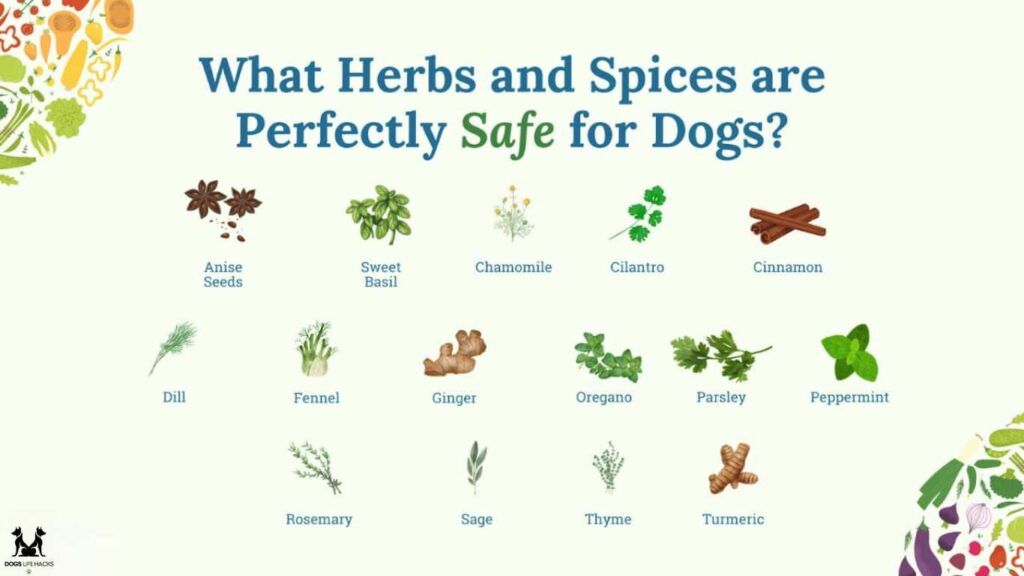
Chamomile
The best and most famous of all the chamomile extracts is the one that helps with calming down. It may act to ease stress, calm the gut, and have a positive effect on one’s swollen tissues or joints. It is a mild herb and it is generally okay to give to most dogs and can be administered in the form of tea or capsules.
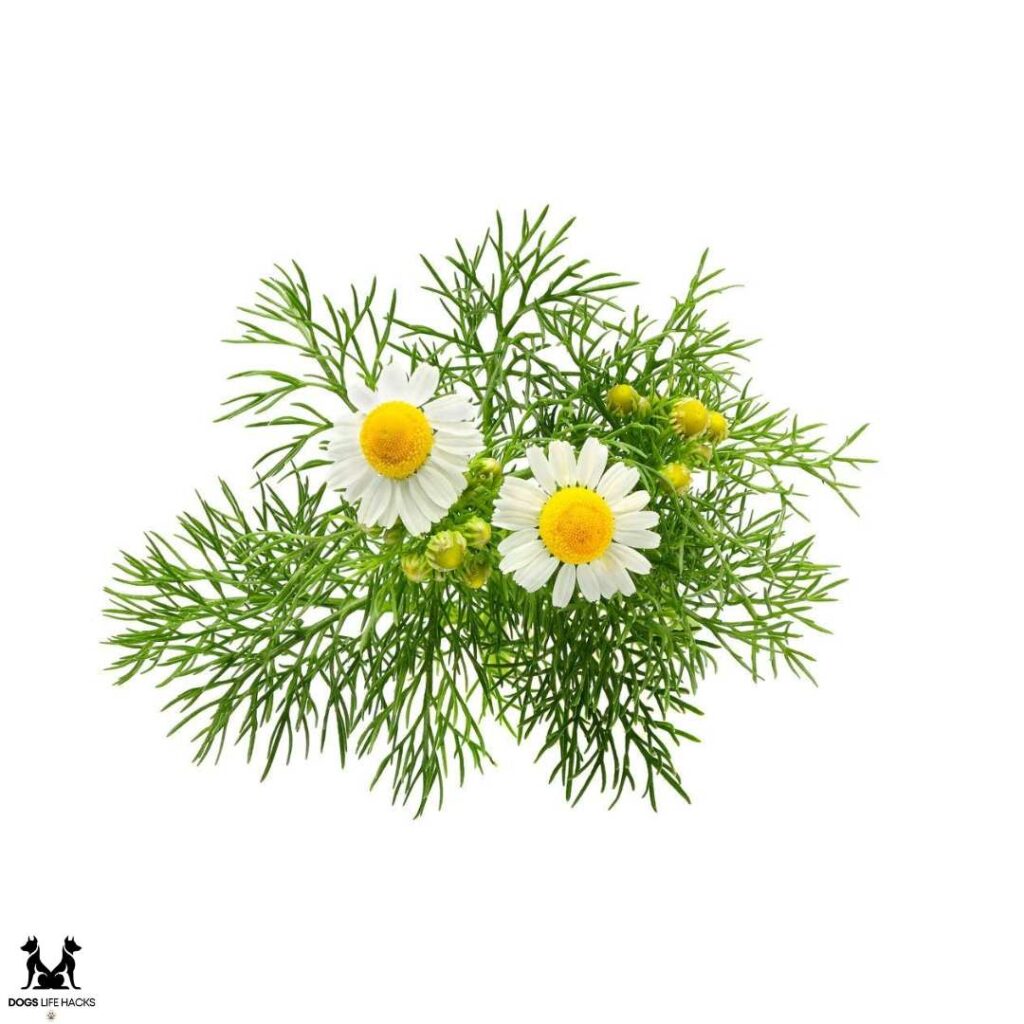
Chamomile is reported to be one of the best herbs suitable for dogs as it has the great capability of calming and soothing the dogs.
Benefits of Chamomile
Chamomile is used as an antioxidant, a treatment for anxiety and depression, for those with digestive problems, and can decrease inflammation. It is most useful in cases where the dog becomes uncomfortable in situations such as during thunderstorms, loud bangs such as fireworks or campaigns, or even in the car among others.
How to Administer Chamomile
You can administer chamomile to your dog as tea, or capsule or mix the dried flowers of chamomile in the dog’s food. Originally, one must begin with a small quantity to determine the pet’s attitude toward it.
Echinacea
Echinacea generally strengthens the immune system of your dog and thus prevents easy contracting of diseases. It is particularly helpful when you are around, or after you have traveled in flu seasons or interacting with other dogs which might be sick.

Echinacea proved to be a potent herb for your dogs to help them strengthen their immune system.
Benefits of Echinacea
Echinacea can strengthen your dog’s immune system and help them fight infections, bacteria, viruses, and other sicknesses.
Appropriate Dosage for Dogs
The dose of echinacea that should be administered will depend on the size and the health status of the given dog. As in every other case, it would be advisable to consult the veterinarian before approaching the herbal remedies.
Ginger
Ginger is a very useful herb especially when it comes to issues that are associated with digestion. There are discoveries that it can work to decrease nausea, enhance digestion, and decrease inflammation in the body. This herb is very useful in cases where the dog has some tummy problems or it easily gets sick while in a moving car.
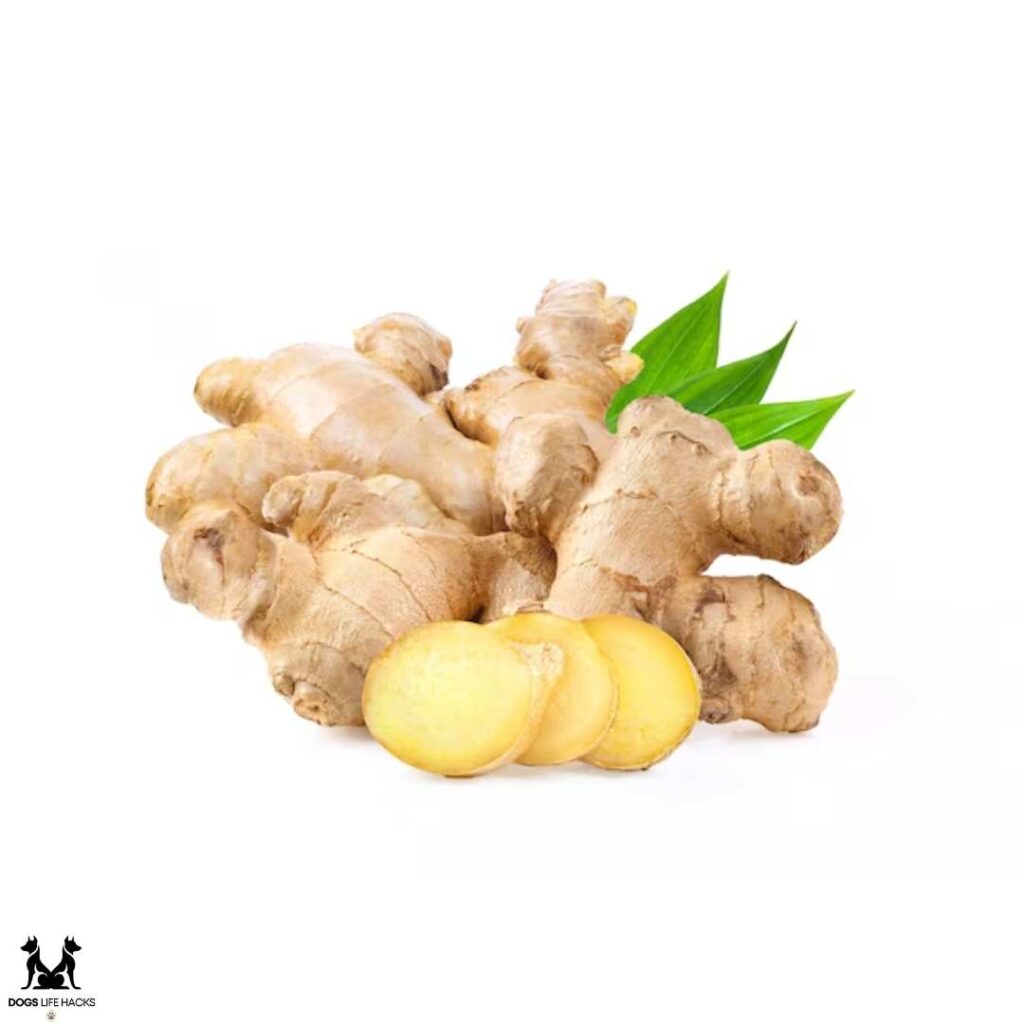
Ginger is a great herb for dogs suitable for enhancing digestion.
Benefits of Ginger
Ginger has properties that assist in the reduction of nausea, digestion problems, and inflammation. It proves especially helpful for dogs suffering from Gastrointestinal issues, or those dogs who have issues with motion sickness.
Ways on How to Feed Ginger to Your Dog
There are several ways through which ginger can be administered to dogs; first, through raw ginger added to the dog’s food, second, through ginger capsules, or lastly; through ginger tea.
Milk Thistle
Some of the varieties include; Milk Thistle which is popular for its liver-shielding features. This compound can assist with cleaning the liver and maintaining it as well as even rebuilding the liver tissue. This herb is particularly useful when the dog has liver problems or takes long-term medication.
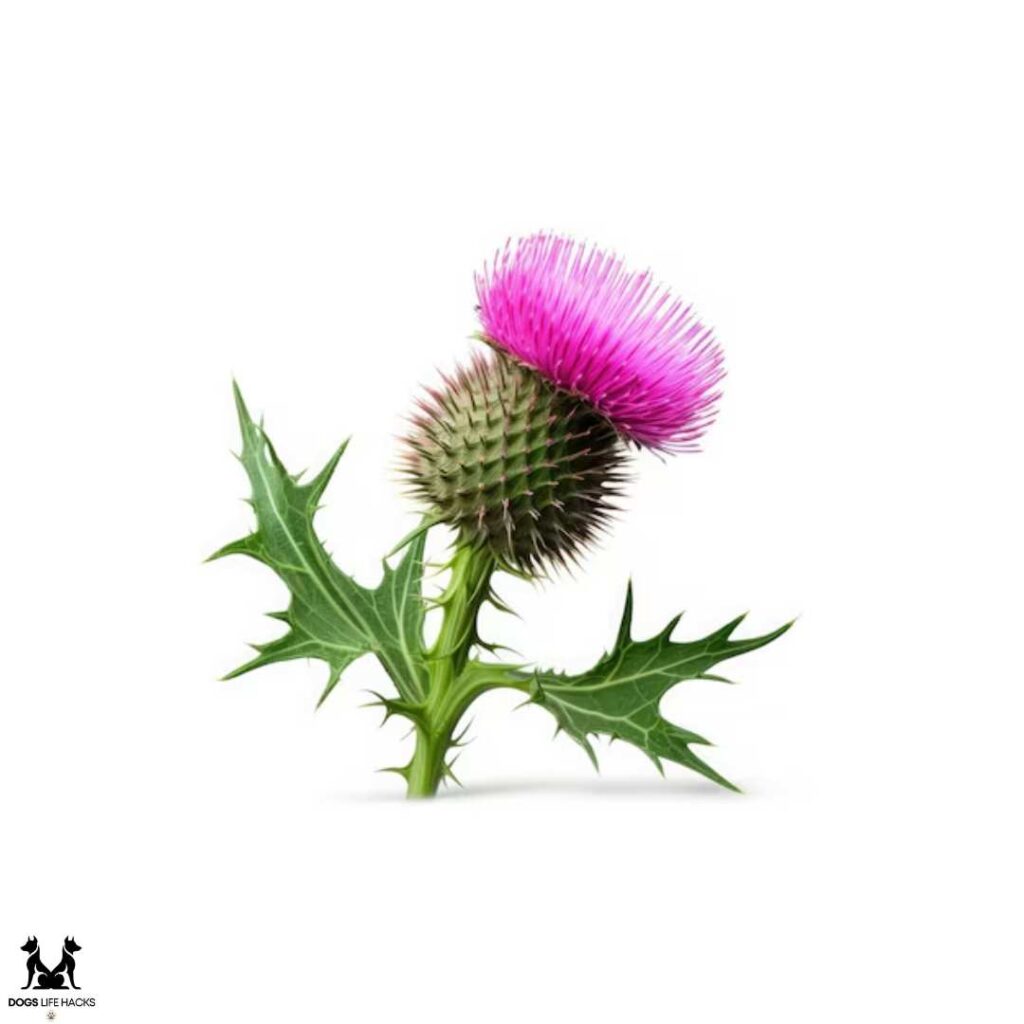
Milk Thistle is a great herb that I know will benefit any dog I feed it to because it helps support a great liver.
Benefits of Milk Thistle
It has been proved that Milk Thistle can cleanse the liver, support it, and can also help in developing new liver cells. This perhaps makes this herb most appropriate for use by dogs that have liver complications or are on long-term drugs.
Ways and Advantages of Consuming Milk Thistle
Milk Thistle is available in the form of capsules, and liquid extracts which can be directly administered or incorporated into your dog’s food. The dosage amounts should be specific and any amount given to the dog in question should first be cleared by a veterinarian.
Calendula
Calendula is a powerful herb that addresses skin issues in a great way. This will assist in the healing of wounds, inflammation, and skin rash as well as skin gentleness. The practice indicates this herb is used externally, whether through ointments or salves.

The particular herb referred to as calendula is an impressive herb good for dogs when it comes to skin healing and repair.
Benefits of Calendula
Calendula has many uses in wound healing, anti-inflammatory properties as well as skin soothing properties. It is reported to be used in furniture polishes, and topical treatments such as lotions and creams, ointments salves, and emollients.
Application Methods for Calendula
There are creams and ointments and the flower can also be used as tea wash on the skin of your dog, make sure you buy the right calendula that is safe for pets and has no paraben, alcohol, or other damaging components.
Turmeric
Curcumin is a bright yellow-colored compound from turmeric that has been rising in popularity due to its prospective benefits for dogs.
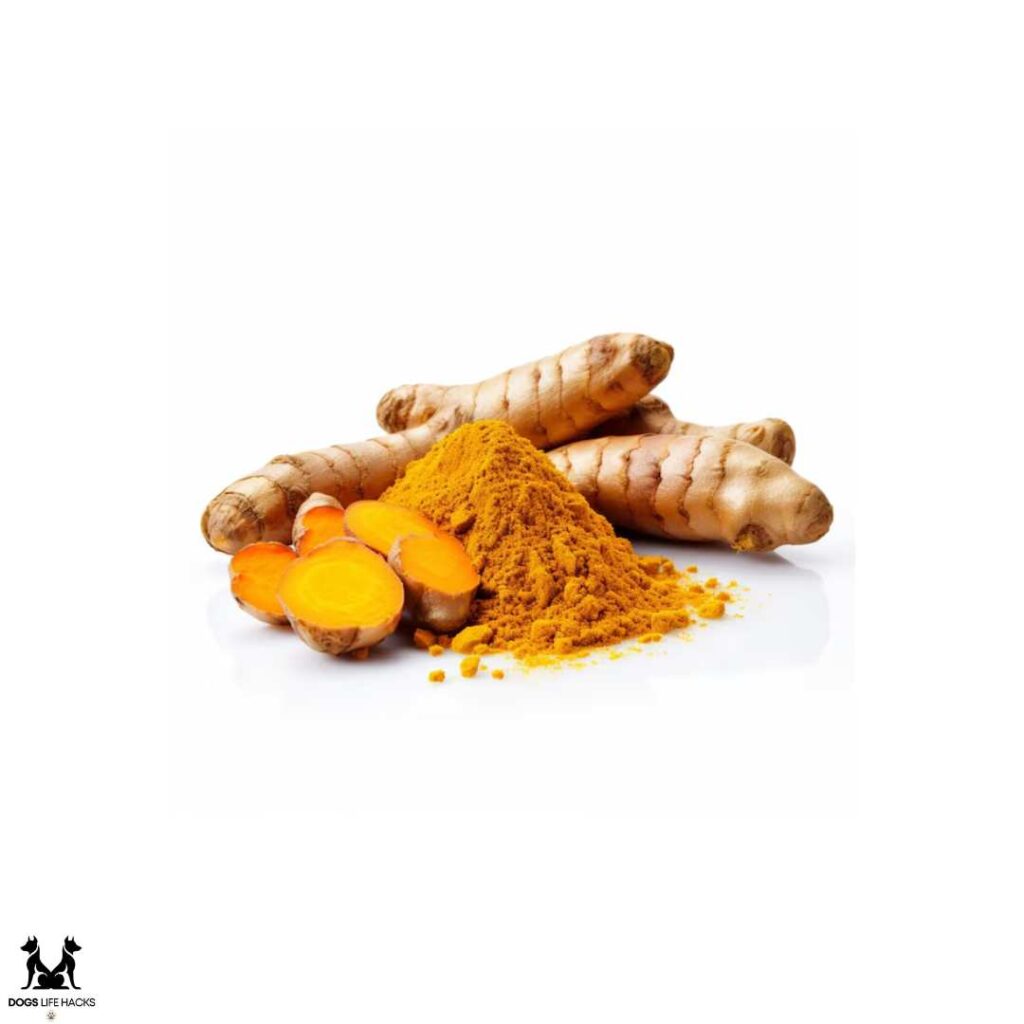
Turmeric herbal medicine is extracted from the root of the Curcuma longa plant and is commonly used for its anti-inflammatory, antioxidant, and antimicrobial action by enclosing curcumin.
Benefits of Turmeric
- Anti-Inflammatory Properties: Turmeric has been noted to possess a strong anti-inflammatory property thus being effective in treating conditions that cause inflammation in dogs such as arthritis hip dysplasia and other joint conditions.
- Antioxidant Support: Said to have this effect due to the antioxidant activity of the nutrients in the turmeric, cellular damages from free radicals are prevented in a dog. This is essential and may cause positive impacts on the general health and thus life expectancy of an individual.
- Digestive Health: Curcumin is beneficial for digestion and sometimes it assists in cases of digestive disorders. It can help relieve the signs of flatulence and beneficial impact digesting.
- Pain Relief: Since it is anti-inflammatory, turmeric can help ease pain in dogs that have pain from various diseases or injuries.
- Cancer Prevention: A few researches indicate that curcumin present in turmeric has prospective cancer-fighting advantages, preventing the propagation of specific cancerous cells and tumor growth.
- Heart Health: Turmeric can increase heart health because it can lower levels of cholesterol and prevent the formation of blood clots, hence increasing the circulation of blood and the overall functioning of the cardiovascular system.
Parsley
Another example is parsley, which is greenery commonly used to decorate dishes and as seasonings, and is also useful for dogs if administered properly.
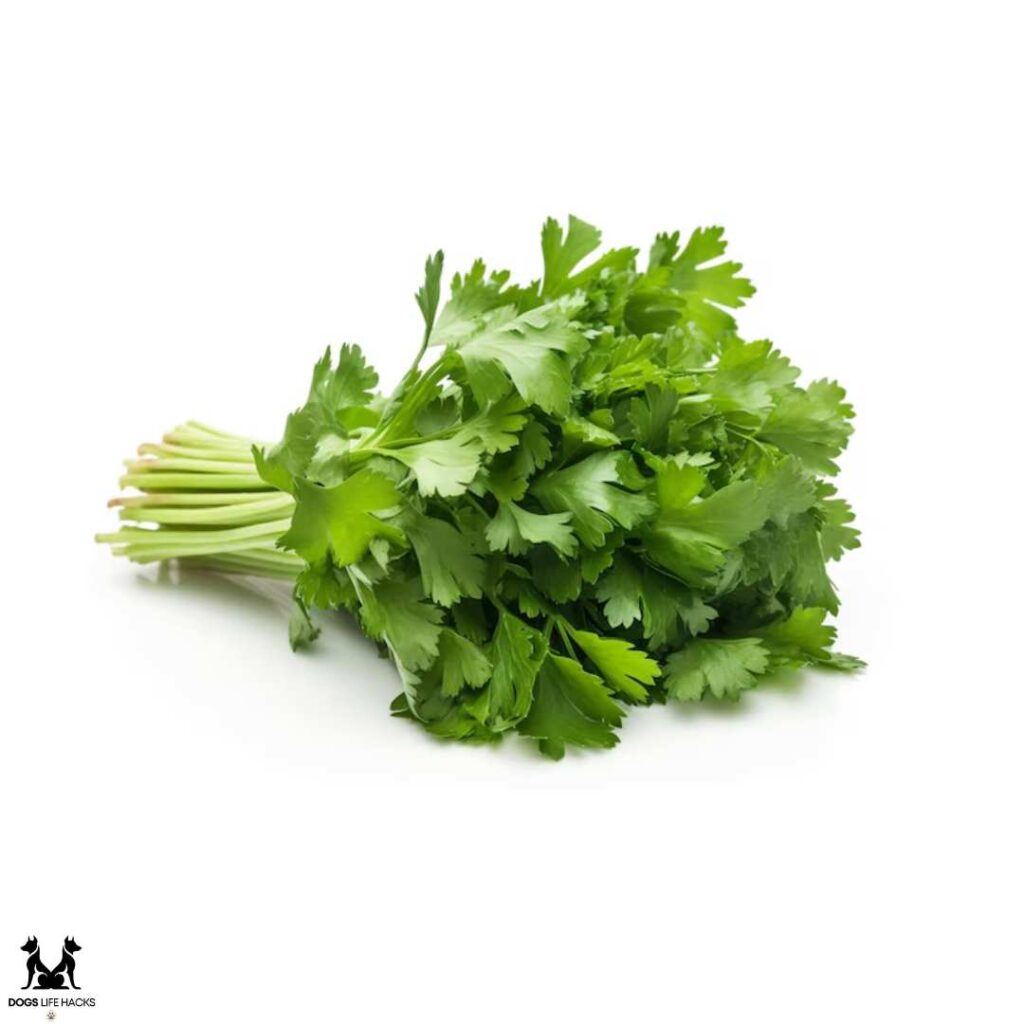
This herb comes in bright green and offers a fresh look and taste, therefore having nutrients and properties that can benefit a dog. Here are some important facts that will help you unravel the versatility, safety, and uses of parsley for your dog.
Benefits of Parsley
- Freshens Breath: Parsley is commonly used to counter the smell of the mouth and, therefore, can be used to treat dogs with bad breath. This eliminates bad odors because the chlorophyll in the parsley goes to work immediately to get rid of the smell.
- Rich in Nutrients: Parsley comes in a plus package of several important vitamins and minerals such as vitamin A, vitamin C, vitamin K, vitamin folate, iron, and antioxidants. These nutrients can help your dog in general health and also improve the immune system of the animal.
- Anti-Inflammatory Properties: Parsley also contains anti-inflammatory compounds therefore it can be used to treat dog’s inflammations such as arthritis.
- Diuretic Effects: More specifically, the mechanism of action underlying the use of Parsley is that it also works as a natural diuretic thus, it aids in the removal of toxins besides enhancing the functioning of the kidneys. Dog water filters are even more important, especially for dogs suffering from urinary incontinence or dogs that need to be purified.
- Digestive Aid: Parsley also has properties that can help in digestion since it assists in the elimination of gas, bloating, and other similar conditions. It can also increase dogs’ appetite where there is low in the dogs.
- Antimicrobial Properties: Parsley has antibacterial properties, which you know that it works a good guard against bacteria or any germs that may cause illness in dogs.
Benefits of Home Remedies For Dogs
The use of plants in the management of diseases in human beings and animals cannot be overemphasized and dates back to the prehistoric period. The given natural remedies are effective for relieving a variety of disorders in dogs without being accompanied by the side effects that come along with regular medications.
Feeding herbs that are beneficial for dogs is scenically oriented and deals only with the symptoms and not the affected dog.
This way, a fan of herbal remedies can prevent chronic diseases, strengthen the immune system, and improve general health. These are particularly great for dogs that have reactions to normal medications or the ones who have long-lasting conditions that need consistent treatment.
Why Herbs for Your Dog
It will help if you explore herbs suitable for dogs as it will be more natural to support the health of your pet. In some cases, the herbs are in combination with conventional medicines while in others they are used as a form of maintaining the good health of the dog.
Some people prefer using herbs to eliminate any sort of side effects that may accompany the standard chemical-based products and enhance their pet’s health.
Natural Healing Properties
Spices are rich natural remedies that can facilitate the recovery processes of your body and its functions.

For instance, chamomile is useful in handling stress-related diseases, echinacea helps in the handling of diseases that are related to the immune system while ginger is used to handle ailments that are related to the problem of digestion.
That way, by including the herbs good for dogs in your pet’s daily diet, you can benefit from these incredible health-improving qualities.
Reducing Dependency on Medicines
Another benefit that is associated with the use of herbs good for dogs is that it may eventually help in cutting down on the use of drugs.
Though occasionally required, traditional drugs directly impact health and most of the time are accompanied by side effects. A natural cure is much preferable since it is sometimes less invasive and is without chemicals.
Herbs to Avoid for Dogs
Specific foods that are toxic to dogs that you should avoid giving to her include:
When it comes to the general health of a dog, many herbs are good for dogs while some are toxic.

Harmful Herbs
While there are foods that are permitted to be given to the dog, some seasonings such as garlic, onion, and even some kinds of essential oils are toxic to the dog. Whenever you want to incorporate any new herb, consulting a veterinarian or doing your research is important.
Symptoms of Herb Toxicity
The signs of herb toxicosis in dogs include vomiting, diarrhea, depression, and seizures. In the case that your dog has consumed the toxic herb, you should take him or her to a vet.
How to Introduce Herbs to Your Dog’s Diet
The addition of herbs that are beneficial for dogs should not be done suddenly into the diet of the dog.
Gradual Introduction
Use small quantities and raise the quantity as seen as appropriate in the process. This makes the system of your dog more responsive and you will be able to note when your dog is producing an unfavourable reaction.
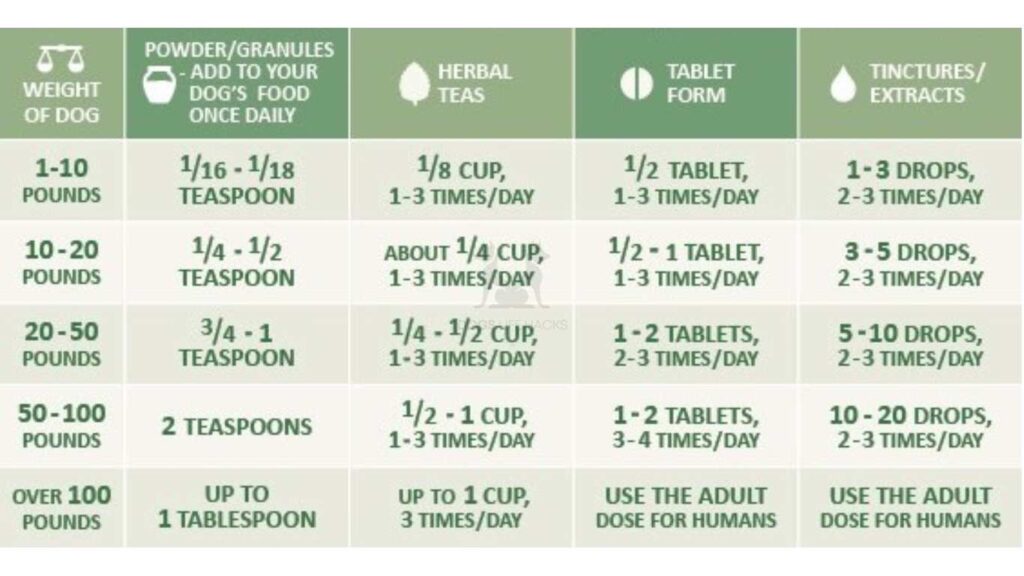
Observing for Allergic Reactions
Keep an eye out for signs of an allergic reaction or an intolerance to certain foods, for example, scratching, redness of the skin or the eyes, or internal distress, including diarrhea or vomiting. If any of these signs present itself, it is recommended that you remove the herb and consult the veterinarian.
Creating Herbal Blends for Specific Conditions
You can develop special mixtures of herbs that are particularly suitable for the benefit of the dog and special ailments.
Anxiety and Stress
Mingle the herbs that help to decrease the level of nervousness such as chamomile and valerian root.
Digestive Issues
In particular, a ginger-fennel-peppermint blend is recommended for digestion problems. Some herbs can also manage nausea, promote digestion, and calm down a troubled tummy.
Skin Problems
Skin conditions can take the combination of calendula, chamomile, and aloe vera to help the skin heal and for soothing.
DIY Herbal Remedies for Dogs
To sum it up, making your herbal remedies for dogs is efficient and safe for your beloved pet’s health.
Simple Recipes
It would be nice chamomile tea, ginger tea, or simple calendula ointment which can be used for calming anxiety or healing the skin.
Proper Storage
It is recommended to preserve your herbal remedies in tightly sealed containers and a cool, dry place out of direct sunlight.
Consulting with a Veterinarian
Any use of herbs should be discussed with the vet before beginning a program with herbs or any herbal treatments.
Importance of Professional Guidance
It is also important that one consult a veterinarian especially when it comes to the type and quantity of herbs that should be given to your dog.
Regular Health Checks
An important aspect of using the herbs on your dog is to keep checking your dog’s health to see how they are responding to the herbs given.
Contraindications and Warnings
To sum up, using herbs that are beneficial for dogs is useful but one has to remember the possible consequences of using these products.
Understanding Possible Reactions
It is important to note that some of the herbs can lead to allergies and also have an effect on the medication being taken. Any change in the diet that you introduce should be done gradually and you should monitor the reaction of the dog.
Monitoring Your Dog’s Health
Supervise your dog’s health and behavior frequently to confirm that the herbs are having a positive impact on him or her with no side effects.
Summary of Herbs Good For Dogs
The incorporation of herbs good for dogs in your dog’s diet has many advantages in the preventive strategies as it enhances immunity, and relieves stress and tension. When you know about the necessity of herbal remedies and how they can be effectively provided to your dog, your pet’s health will be boosted ordinarily and naturally.
Any herbal supplement should first be discussed with a vet before use and the reaction of the dog should be taken into consideration at all times.
Explore the use of herbs fully and progress to a successful decision for the betterment of the quality of your dog’s life. That is why in taking care of our dogs, it is advisable to consider the herb’s natural healing abilities to treat the holistic welfare of the dog.
FAQs About Herbs Good For Dogs
What herbs are best for dogs?
The majority of the commonly used culinary herbs are not toxic to Fluffy as well as Fido. Besides, it contains; basil, sage, parsley, rosemary, cilantro, and lavender. It is safe for Fido to take in turmeric and cinnamon but catnip, dandelion, valerian, echinacea, and goldenseal are safe for Fluffy. However, certain herbs are rather good for your pet.
Can you put herbs in homemade dog food?
There are many dried herbs that I integrate into my dog treats and my dog’s homemade dog food. I also incorporated it in my dog treat baking mixes and of course in my dehydrated vegetable topper for my home-cooked dog food. Dry herbs are used to enhance the flavor of the homemade dog food and the nutrients help in the general enhancement of the dog’s health.
What herbs and vegetables are safe for dogs?
Herbs – Want both pet-friendly plants to have at home, and delicious spices to add to your dishes? I think it is a great idea to go with herbs, maybe specify which ones. It is essential to know that basil, sage, thyme, and rosemary are great delightful herbs, safe to use. African Violets – This is a green plant as well as a flowering plant.
Is Tulsi safe for dogs?
Holy Basil (Tulsi) Is Not Toxic To Dogs. It is officially recognized to be dog-friendly with some tips for those occasional, verdant blunders. Holistic Holy Basil is perfectly safe for dogs in modest portions, it also reduces inflammation. In addition to common reactions there are more serious reactions like excessive drooling or an upset stomach, call your vet.
Is ginger safe for dogs?
Ginger is suitable for dogs with moderate to low sensitivities and in moderation can have many health advantages for your dog. Being a root, fresh ginger has essential nutrients that can help combat free radicals and has anti-inflammatories that boost blood circulation, reduce bloating, and enhance the heart’s performance.
Related Articles
- Is Chicken Liver Good For Dogs Complete Guide – Cons & Pros
- Can You Feed Dogs Raw Chicken? Hidden Risks & Benefits
- Is Avocado Oil Bad For Dogs? Discover Cons & Pros & Truth
- Can Dogs Eat Mackerel? Benefits, Risks & Surprising Truth!
- Find Healthy Beef Jerky for Dogs – Yummy Guide for Pups!
- How to Use Eggshells For Dogs to Improve Your Dog’s Diet
- Best Fish for Dogs – Ultimate Guide to Healthy Pet and Diet
- Are Chicken Feet Good for Dogs? Benefits and Safety Tips
- Can Dogs Eat Crab Apples? Safe Snack or Dangerous Treat?
- Can Dogs Drink Alkaline Water? Uncover Shocking Cons & Pros
- Curious Can Dogs Have Jicama? Secrets You Need to Know!
- Irresistible No Bake Dog Treats Your Furry Friend Will Love!
- Unleash the Best Bone Broth For Dogs-Optimum Nutrition
- Can Dogs Have Sunflower Butter Safe Treat or Hidden Danger?
- Discover Nutrient-Rich Dog Food With Fish for Stronger Pets
- Deadly Hematochezia in Dogs: Causes, Symptoms, and Cure
- How to Treat Dog Rash on Stomach? Causes & Quick Remedies
- Wholesome Vegetable Dog Treats for a Happy, Healthy Pup
- Delicious Peanut Butter Banana Dog Treats Your Pup Will Love

